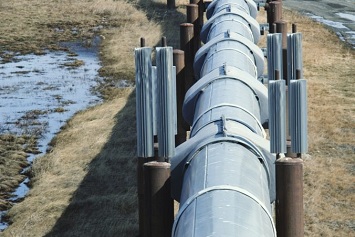Proponents of energy infrastructure projects such as natural gas pipelines and electricity transmission lines that require federal licenses or permits welcomed an EPA proposal to amend regulations to implement the state certification process authorized by Section 401 of the Clean Water Act (CWA) for these projects.

The proposal originated in an April 2019 Executive Order (EO) 13868 (Promoting Energy Infrastructure and Economic Growth) in which President Donald Trump gave the EPA 120 days to propose rules to promote private investment in the nation’s energy infrastructure through efficient permitting and increased regulatory certainty. The specific objectives of the proposal are to condense the timeline for the certification process and limit the scope of factors states may consider when providing federal agencies with certifications for projects that affect state waters.
“Our proposal is intended to help ensure that states adhere to the statutory language and intent of [the] Clean Water Act,” said EPA Administrator Andrew Wheeler. “When implemented, this proposal will streamline the process for constructing new energy infrastructure projects that are good for American families, American workers, and the American economy.”
Compliance with the CWA
CWA Section 401 requires that a project proponent provide federal permitting agencies with a certification from the state in which the project will occur; the certification indicates that the project will comply with CWA water quality standards in that state. Additional state certifications are required if the project will affect navigable waters in other states. If there is no applicable water quality standard, the state must certify to that effect. Section 401 indicates that the state or authorized tribe must act on a certification request in a reasonable time not to exceed 1 year.
Certifying entities have exercised their Section 401 authority for dredge-and-fill activities in waters of the United States that require Section 404 permits from the Army Corps of Engineers (Corps), for Section 402 industrial and municipal point source discharge permits issued by the EPA, for permits issued under Sections 9 and 10 of the Rivers and Harbors Act by the Corps or U.S. Coast Guard, and for projects requiring licenses from the Federal Energy Regulatory Commission (FERC) and Nuclear Regulatory Commission.
Impact of Denials
In its economic analysis of the proposed rule, the EPA reviewed the impact of a state’s denial of project certification. The Agency states:
“[D]enials can delay proposed projects, which may increase total costs above the original cost estimates. Second, a denial may cause the project proponent to forgo the project after having invested funds and staff time into project development, environmental assessment, and mitigation planning. In addition to direct impacts on project proponents, recent section 401 certification denials on large infrastructure projects, such as natural gas pipelines and export terminals, highlighted the potential for section 401 certification denials to have broader economic impacts. While data to quantify these effects are limited, studies have noted that recurring section 401 certification denials of FERC-approved natural gas pipelines affect transportation of natural gas and could jeopardize the reliability of gas-fired electric generators.”
Certifying Role Is Limited
In the proposal, the EPA notes that Section 401 envisions a robust state and tribal role in the federal licensing or permitting process. However, the section also “places limitations on how that role may be implemented to maintain an efficient process, consistent with the overall cooperative federalism construct established by the CWA.”
Under the proposal, the EPA would:
- Reaffirm that CWA Section 401 requires certifying authorities to act on a request for certification within a reasonable period of time not exceeding 1 year. The Agency is also soliciting comment on establishing regulatory language that specifies that a reasonable period of time “shall generally be considered to be 6 months, but in any event shall not exceed 1 year.”
- Clarify the procedures for a federal agency to notify a certifying authority that a waiver from the certification requirement has occurred if the certifying authority fails or refuses to act before the regulatory deadline.
- Establish that the “scope of a Clean Water Act section 401certificationis limited to assuring that a discharge from a federally licensed or permitted activity will comply with water quality requirements.” The objective here is to prohibit certifying authorities from imposing certification conditions based non-water-quality conditions such as air quality concerns, public access to waters, energy policy, or other multimedia non-water-quality factors. The proposed requirement may conflict with a U.S. Supreme Court ruling (PUD No. 1 of Jefferson County and City of Tacoma v. Washington Department of Ecology, 511 U.S. 700, 1994) in which the Court said the CWA could be reasonably interpreted to allow certifying bodies to impose additional requirements beyond those necessary to ensure water quality. But the Agency says that the Court “was careful to note that a state’s authority to condition a certification ‘is not unbounded’ and that states ‘can only ensure that the project complies with any applicable effluent limitations and other limitations.’”
- Establish a prefiling meeting process when the EPA is the certifying authorityto ensure that the Agency receives early notification of anticipated projects and can discuss its information needs with the project proponent. The prefiling meeting process is intended to protect the limited certification review time frames for state and tribal resources.
The EPA says that it engaged in formal consultation with state, local, and tribal partners, as well as other federal agencies, to develop the proposed rule. Under the EO, the EPA is scheduled issue a final rule by May 2020.
